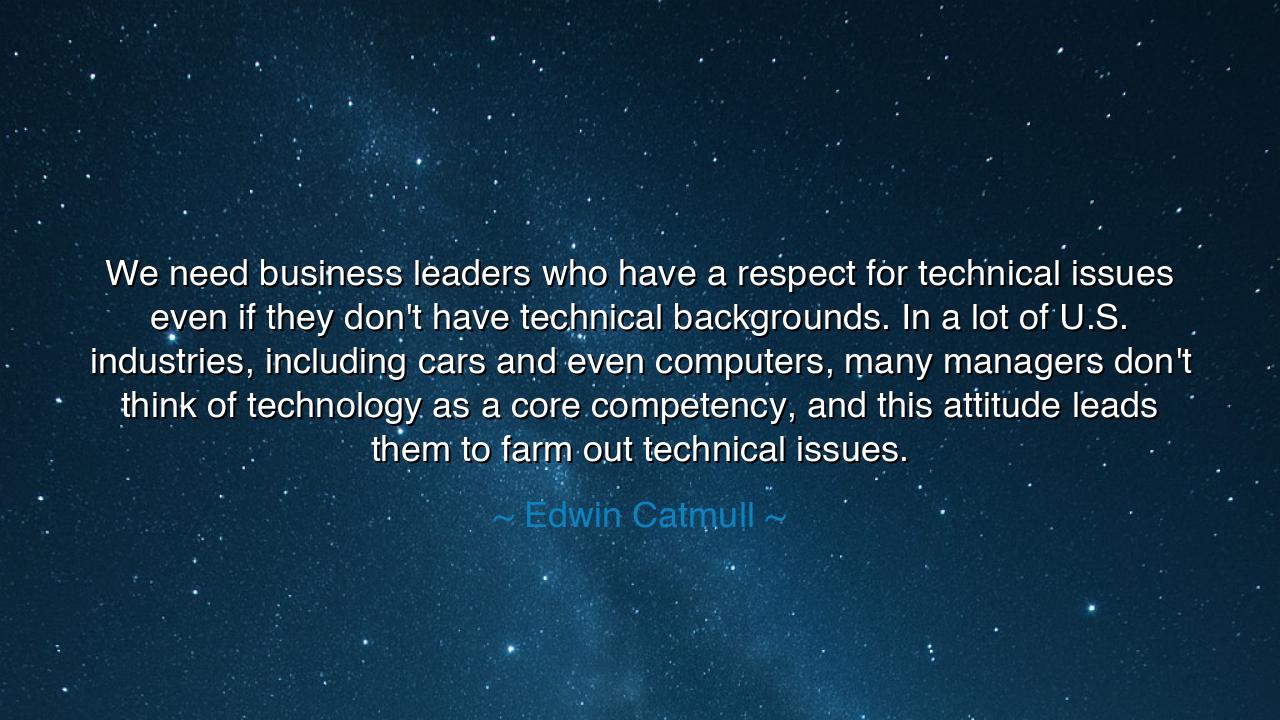
We need business leaders who have a respect for technical issues
We need business leaders who have a respect for technical issues even if they don't have technical backgrounds. In a lot of U.S. industries, including cars and even computers, many managers don't think of technology as a core competency, and this attitude leads them to farm out technical issues.






Hearken, O children of generations yet unborn, and attend to the words of Edwin Catmull, who spoke with insight into the delicate balance of leadership and mastery: “We need business leaders who have a respect for technical issues even if they don't have technical backgrounds. In a lot of U.S. industries, including cars and even computers, many managers don't think of technology as a core competency, and this attitude leads them to farm out technical issues.” In these words lies a timeless truth: that wisdom in leadership demands reverence for the crafts that underpin progress, even when the leader is not a craftsman themselves.
Consider first the nature of respect for technical issues. Catmull observes that industries often falter when leaders treat technology as peripheral, delegating its mastery to others without truly valuing its significance. This mirrors lessons from the ancients: the general who ignored logistics and engineering often lost wars, not from lack of bravery, but from failing to honor the technical foundations of success. Leadership divorced from understanding is fragile; only through respect for the craft can vision be translated into enduring achievement.
The phrase “even if they don't have technical backgrounds” carries profound insight. A leader need not be a master of every tool or code, yet they must possess curiosity, humility, and a willingness to engage with the underlying principles of their enterprise. History provides many examples: Alexander the Great consulted engineers to devise siege engines, recognizing their indispensable contribution. His victories were not merely the product of courage, but of appreciation for technical mastery and the wisdom to integrate it into strategy.
Catmull also warns against the tendency to farm out technical issues, a practice that severs leaders from the lifeblood of innovation. In industries from automobiles to computers, delegating without comprehension can lead to decisions that ignore practical realities, stifle creativity, and erode competitive advantage. The lesson is ancient: kings who ignored advisors of specialized skill often doomed their realms, while those who listened, learned, and respected expertise ensured prosperity and resilience.
Consider the story of Thomas Edison, who surrounded himself not only with brilliant assistants but with managers who understood, or at least respected, the technical challenges of invention. His laboratory became a crucible of creation because leadership did not dismiss the importance of skill, knowledge, or detail. Catmull’s observation echoes this historical truth: leaders who revere technical knowledge, even indirectly, cultivate innovation and strength.
From this reflection emerges a lesson for all ages: true leadership integrates vision with respect for the tools, processes, and crafts that sustain it. Ignorance of technical realities invites failure; reverence, curiosity, and engagement empower decisions that are informed, strategic, and transformative. A wise leader does not merely command, but seeks to understand and harmonize with the expertise around them.
Practical action flows naturally from this wisdom. Seek to understand the technical foundations of your field, ask questions, and cultivate humility in the face of mastery. Build teams that are empowered but guided, ensuring that decisions honor the intricacies of technology and craft. Leadership is strengthened when respect, knowledge, and vision converge, rather than when it rests solely upon authority.
Finally, remember the eternal truth: industries, empires, and societies flourish when leadership respects the unseen structures that uphold them. Edwin Catmull’s words are a call to heed, learn, and honor expertise, to weave vision with mastery, and to recognize that the strength of any endeavor lies not only in ambition, but in the wisdom to engage with the technical soul of its craft.
If you wish, I can also craft a narration-ready version of this passage, with rises and falls that highlight the heroic, reflective, and instructive cadence of Catmull’s insight.






AAdministratorAdministrator
Welcome, honored guests. Please leave a comment, we will respond soon